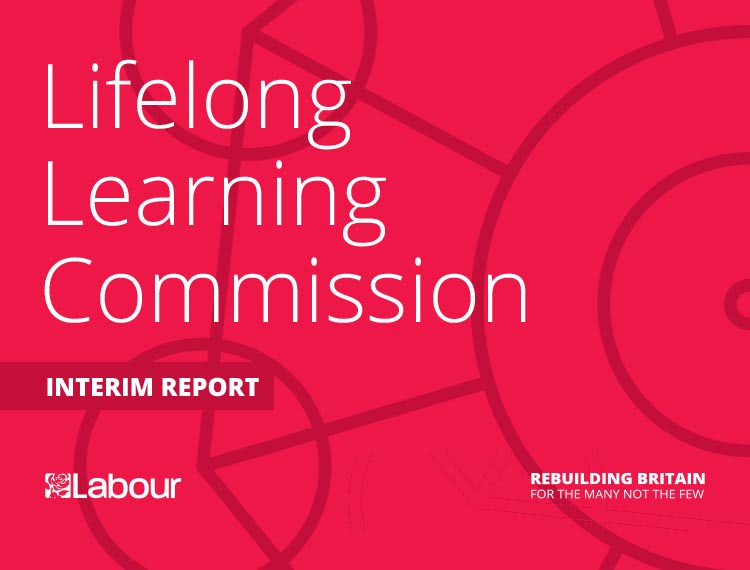The interim report of the Labour Party’s Lifelong Learning Commission – Sector Response

The opportunity to learn throughout your life is fundamental to society and should be placed at the forefront of education policy
Published today (1 Aug), is the interim report of the Labour Party’s Lifelong Learning Commission, which was set up to inform the Labour Party’s proposals for a National Education Service. The commission’s final report will be published in the autumn.
At a time when the world – and the workplace – is changing at an unprecedented rate, it is more important than ever that people from all backgrounds can access learning throughout their lives.
Years of austerity have devastated funding for adult learning and left participation in lifelong learning at a low ebb. Labour’s plan for a National Education Service recommends the revival of accessible, ‘cradle-to-grave’ learning which is open to all regardless of age, background or circumstance, a system of lifelong learning which is not an ‘optional extra’ but an integral part of a dynamic, cohesive and learner-centred system.
TOWARDS A NATIONAL EDUCATION SERVICE: Education is what empowers us all to realise our full potential https://t.co/uHldGTRsio
— FE News (@FENews) July 31, 2019
Labour’s Lifelong Learning Commission, working with colleagues from across the post-16 education sector, is set to develop proposals for reforms that would work in the interests of people, providers, communities and employers alike.
Identifing some of the major issues with the current education system and seeks to set out a radical vision for lifelong learning in the twenty-first century, this report, along with the Commission’s final report later in the year, will inform Labour’s National Education Service, with the hope that our society will become one where opportunities for high quality learning throughout life are available in every community.
About The National Retraining Scheme
The National Retraining Scheme is a new Government scheme to help prepare adults for the future changes to the economy, including those brought about by automation, and help them retrain into better jobs. The first part of which, Get Help to Retrain, has just reached its first users in the Liverpool City Region.
The National Retraining Scheme is being developed through unique partnership between the CBI, TUC and Government, as well as a user-centred, test and learn approach, starting small and developing each part of the scheme in parallel, testing it rigorously and only rolling it out when it’s ready to meet the needs of its users.
As part of this, DfE are exploring how to break down barriers to learning throughout life, including making retraining an accessible option for busy, working adults. DfE will look carefully at the further education budget ahead of the Spending Review.
DfE are considering adult skills more widely as a department and will therefore be considering trends in the take-up of adult education as part of this. In addition, they are looking carefully at further education funding in preparation for the Spending Review. They are considering how effective the funding and regulatory structures are in supporting high quality provision, and in line with the aims of the Post-18 Review, to ensure a coherent vision for further and higher education.
With effect from today (1 August 2019) approximately half the adult education budget will be devolved to six Mayoral Combined Authorities and the Greater London Authority. As areas build their Local Industrial Strategies and begin to evidence local skills needs through their Skills Advisory Panels, devolving the AEB enables them to directly support adults in developing the skills that local employers need, reducing skills shortages, boosting productivity and economic prosperity and improving wellbeing in communities.
Sector Response
 Stephen Evans, Chief Executive, Learning and Work Institute, and member of the Labour Lifelong Learning Commission, said:
Stephen Evans, Chief Executive, Learning and Work Institute, and member of the Labour Lifelong Learning Commission, said:
“It’s great to see further momentum building behind the need for a greater focus on lifelong learning. As a member of the Commission, I think one of the key points of the interim report is its recognition of the wider benefits of and case for adult learning. This underpins Labour’s idea of a National Education Service that works with other public services, part of a joined-up and collaborative approach.
“I’m looking forward to the next phase of the Commission, exploring how to turn this vision into a reality. I’d argue that high quality careers advice and an entitlement to lifelong learning can be core building blocks, alongside a longer term approach to policy and funding. Ultimately, lifelong learning can boost the economy and people’s life chances, as well as improving health and well-being and civic participation and being a good thing in itself.”
 Matt Waddup, Head of policy and campaigns, UCU said:
Matt Waddup, Head of policy and campaigns, UCU said:
“The importance of lifelong learning for both individuals and our society is huge, yet in recent years opportunities have shrunk rather than expanded. The opportunity to learn throughout life is a fundamental right and should be central to any national education service. This interim report adds to the many recent calls for a proper focus on, and investment in, the sector and places lifelong learning at the forefront of the debate around the need for reform.
“Everyone, regardless of age, background or finances should be able to access the learning they need and it should be a priority for this, or any future, government to develop a vision for an education system which truly works for everyone and we look forward to seeing how the final report puts this vision into reality.”
 Tom Bewick, Chief Executive of the Federation of Awarding Bodies (FAB), said:
Tom Bewick, Chief Executive of the Federation of Awarding Bodies (FAB), said:
“The big idea at the centre of Labour’s plans is ‘cradle to grave’ lifelong learning. I’ve read nothing in this interim report to suggest that the party is any closer to articulating in detailed policy terms how this will happen. The focus on a clear set of entitlements linked to financial incentives is potentially the most illuminating observation thus far.
“The Labour commission, like a number of other similar lifelong learning commissions in this space, should move beyond the well trodden path of simply analysing the problem; and start to tackle head on the big questions of our time:
- Why do we allocate over 90 per cent of all education spending on under 25 year olds?
- Why are we investing so much money in sending students to bricks and mortar institutions when technology and online learning could provide much more cost effective alternatives?
“With the 4th industrial revolution and rising life expectancy upon us, we need perhaps less rhetoric and more practical solutions about the exact enabling framework that a future government would try to implement. Seeking to recreate the monolithic structures, that is the NHS model, is not going to address the realities of a highly specialised and disaggregated modern jobs and skills markets.”
 Association of Employment and Learning Providers Chief Executive Mark Dawe, said:
Association of Employment and Learning Providers Chief Executive Mark Dawe, said:
“AELP welcomes the professional and methodical approach that the Commission has adopted and the fact that all of the relevant stakeholders are being consulted before the final report appears.
“We agree with the Commission that there are certain aspects of the FE and skills system where we want stability – funding policy and systems, regulation and processes – but at the same time the system needs to be responsive to the economic cycles, employer and social needs. There will always be unexpected shocks ranging from local to global ones, so ‘settled and stable’ doesn’t always work. The big challenge therefore is flexibility to respond, which means funding the right provider for the right job and programmes that are growing rapidly in response to demand. We must recognise that steady state funding doesn’t work for this.
“In AELP’s view, the way forward is collaboration and partnership working which could enable more strategic and efficient approaches, drawing on the expertise of each provider and ensuring equal status for all providers involved.”
 Councillor Stephen Lambert, Director, Education4Democracy CIC, said:
Councillor Stephen Lambert, Director, Education4Democracy CIC, said:
“This is a timely report by Labour’s Commission which has placed life-long learning firmly at the top of the public policy agenda. Learning shouldn’t stop at 18 or 22, but should be accessible for everyone throughout the life-cycle even up to the age of 90.
“Labour’s commitment to further and adult and community education is to be endorsed. For too long the FE and AE sector has been starved of resources by central government. A properly funded continuing education service not only meets the needs of individuals helping to boost mental health and citizenship skills, but helps to meet the needs of the economy too. Labour’s ambitious document, outlining a range of policies ,will help to address deep seat structural inequalities which has blighted much of our nation outside London and South East. Our educational system must be for the many and not just the few.”
An Association of Colleges (AoC) spokesperson said:
“ We welcome the Lifelong Learning Commission’s interim report and the proposals to create a system that is accessible to everyone no matter their age, background or circumstances. The Labour Party has joined the growing number of organisations recognising the vital role of colleges in a lifelong learning system. It is encouraging to see the commission take on a breadth of issues from regional disparities to the fall in adult learners. We look forward to continuing to support the work of the commission as it develops its final report.”
 Kirstie Donnelly, Managing Director at City & Guilds Group commented:
Kirstie Donnelly, Managing Director at City & Guilds Group commented:
“I am delighted to be a part of Labour’s Lifelong Learning Commission, and today’s interim report offers a long term strategic vision, which includes realistic ways to create a sustainable system. Lifelong learning is key to unlocking economic prosperity and social mobility. The findings are a great step forward, and I look forward to continuing work in this vital area leading up to the final report.”
 A Department for Education spokesperson said:
A Department for Education spokesperson said:
“The Prime Minister has said that further education and skills will be a priority for this government and appointing the Education Secretary to take the lead for this vital work is a reflection of that commitment.
“We have recently began our roll out of the National Retraining Scheme which will be pivotal in helping adults across the country whose jobs are at risk of changing to gain new skills and get on the path to a new, more rewarding career.
“We’re beginning with the launch of the Get Help to Retrain digital service in the Liverpool City Region first, working alongside our business and union partners, to make sure we get it right and the service works for the people who need it.”












Responses